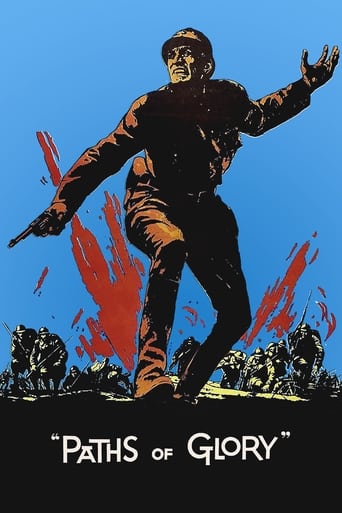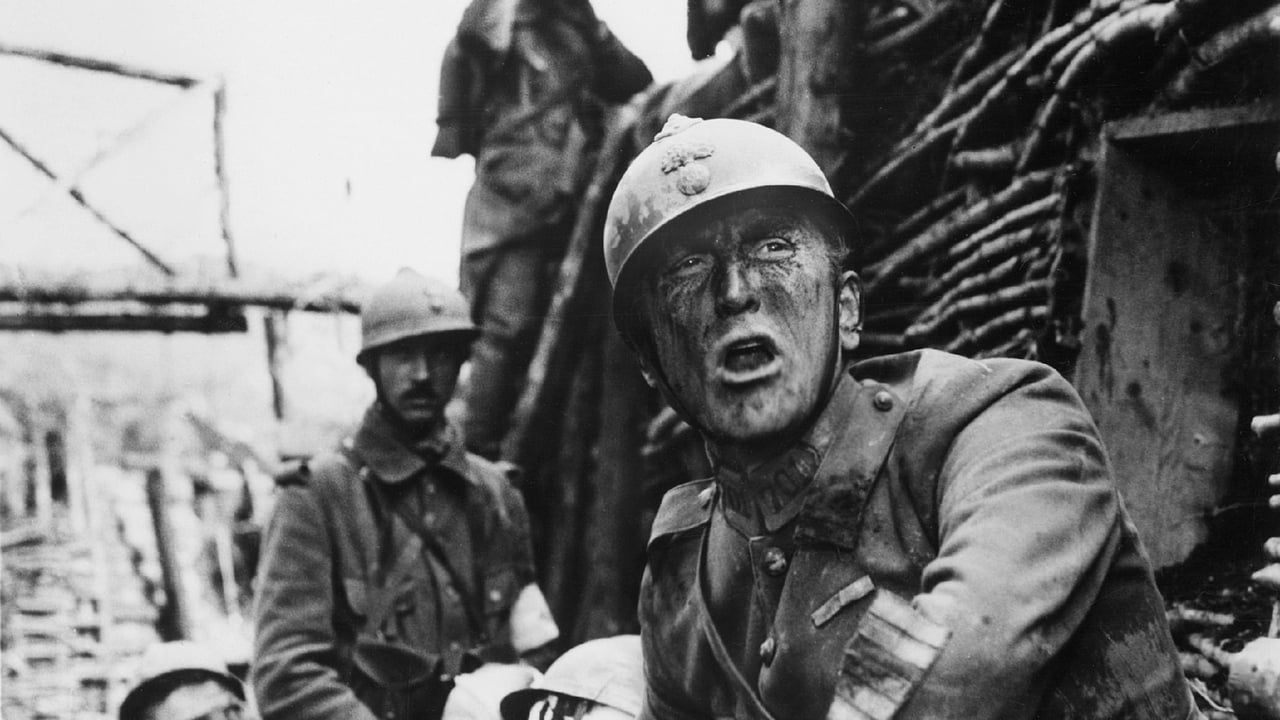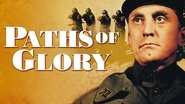James Hitchcock
In 1916 a French regiment is ordered to attack "the Anthill", a strongly fortified German position. The attack proves a disastrous failure; the French suffer heavy casualties and none of their soldiers succeed in reaching the German trenches. When a second wave of troops refuse to attack, their commanding officer General Mireau desperately orders his artillery to open fire on them to force them onto the battlefield. The artillery commander, however, refuses to do so without a written order. To try and deflect blame from himself for the failure of the offensive, Mireau orders three soldiers from the regiment, chosen at random, to be tried for cowardice. The task of defending the accused falls to Mireau's subordinate Colonel Dax, a lawyer in civilian life.The film was controversial when it was first released in 1957; it was banned in France, where it was regarded as a slur on the honour of the French Army, until 1975. It was also banned for a time in Switzerland and Franco's Spain and (remarkably) in West Germany. Films with a strongly anti-war theme were perhaps unusual in the fifties, a period during which American (and British) war films were mostly set in World War II and were generally patriotic in tone, with war shown as something heroic. World War I, which could not so easily be turned into a glorious fight for freedom, was largely ignored."Paths of Glory", however, was based on a novel by Humphrey Cobb which had been written in the very different political climate of 1935, when following the slaughter of 1914-18 pacifism was more in fashion. At first sight, Cobb's title looks deliberately ironic because he depicts war as something far from glorious. To those who recognise its source, however, it appears not so much ironic as grimly appropriate. It comes from Thomas Gray's poem "Elegy Written in a Country Churchyard", and what Gray wrote was "The paths of glory lead but to the grave".The film makes its case against war in two ways. The first is by emphasising the futility of war. The only German we see is a female civilian captured by the French; no German soldiers appear at all. I think that this was a deliberate decision by director Stanley Kubrick; the French soldiers seem to be fighting not against men like themselves but against some nameless, invisible and inexorable force of nature, able to cut them down at will. They appear to have no more chance of capturing the Anthill than they would of capturing the moon.The second way in which Kubrick makes his case is by emphasising the gulf between the generals and the man under their command. This is not just a difference in social class- indeed, this element is not emphasised as much as it is in some British productions about the war. It is more a gulf in the way in which they experience the war. The general staff, safe in their chateaux away from the lines, have no real idea of the hardships and dangers confronting those under their command.Moreover, the generals do not even seem to be motivated by patriotism or a belief in the rightness of their cause. They are much more concerned about self-advancement and their own brand of office politics. When Mireau is first ordered to take the Anthill he demurs, believing that the objective can only be attained, if at all, at an unacceptable cost in French lives. It is only when his superior, General Broulard, intimates that a successful attack might be rewarded with a promotion that he changes his mind. When Dax complains about Mireau's behaviour, Broulard assumes that this is all part of a ploy to obtain Mireau's job; it never occurs to him that Dax might be sincere about trying to save the lives of three unjustly accused men.This was not the first film to be directed by Kubrick, but it was perhaps the first to bring him to public notice. The battle scenes are well done, even if they lack the realism of more modern war films such as "Saving Private Ryan" or the recent "Dunkirk". The trial scenes, during which it becomes increasingly uncertain as to whether Dax, for all his forensic skills, will be able to save the three accused. Kirk Douglas is excellent as Dax, a sane and humane man in an insane and inhumane world, and he receives good support from the rest of the cast. Particularly good is George Macready as General Mireau, a man driven literally mad by unbridled ambition to the point where he is prepared to sacrifice hundreds of lives, not for the honour and glory of France but for the honour and glory of General Mireau.The film is perhaps less well-known today than some of Kubrick's later efforts, but I would regard it as his first masterpiece, equal or superior in quality to virtually anything in his later work, including his two later anti-war films, "Dr Strangelove" and "Full Metal Jacket". Douglas was also to collaborate with Kubrick in his second great masterpiece, "Spartacus". 9/10
Tyson Hunsaker
It took a while to see the film that put Stanley Kubrick on the map as a force to be reckoned with. Paths of Glory was a war film with an interesting premise and has the reputation for being an "anti-war" piece on the dehumanization of soldiers. With Kirk Douglas as the star, the plot centers around prideful and power-hungry French military officers who order an impossible mission from a battalion who fleas upon defeat and is accused of cowardice. Many other films by Kubrick shows his powerful and masterful filming style and Paths of Glory is no different. The focus is strong and it's difficult to take your eyes off the screen throughout the picture. Good use is made of these phenomenal actors who give heartfelt performances and deliver strong and emotionally piercing lines. The film is a short and crisp 88 minutes so it's easy to watch anytime. This also makes the pacing clean and the viewer will know every scene, shot, and frame is completely intentional and justified. Not a single moment of this fascinating and well done film is wasted and the talented actors are utilized to their fullest. Perhaps any downside to this film is the first 20-30 minutes in which the viewer may be wondering what kind of film they're watching and for what purpose. It's easy to see how upon release, however received with high regard, was met with some confusion as to the substance of the story and what it was trying to say. It's not a film that glorifies war or conflict; in fact, the concept of battle (physical or psychological) can cause some irritation for the viewer. This was most likely intended and it was probably a good move in the long run.Personally, I enjoyed Paths of Glory throughout the picture and found it as important as it is beautifully directed. However, the most impactful piece of the story is the final scene in which a woman is singing to a group of soldiers in a bar. Not many other scenes have had so much emotional impact and beauty that it truly made Paths of Glory a personal favorite. Really no complaints about the quality of this film or the personal pressure points it wasn't afraid to touch. It's also amazing how those emotions can be pierced so powerfully more than 50 years after this was released. It's a grand milestone in filmmaking that deserves much more attention and is highly recommended to anyone who has the chance to see it. It's simply amazing!
PetarDuric
Kubrick is definitely one of the greatest movie directors and it also shows us here what he's capable of. As one of the characters is driven by the mad will for promotion he commands an attack that has completely killed the whole squad and then he tries to turn things around and blame it on three guys. It was just outrageous how they got sentenced to death and it all goes down as officers try to do everything what they can to get Staff in sparing those man, but he is just trying to get everyone to believe him. Those man are executed, next morning it all goes down as Mireau finds out about how he was set up and thing starts unravel what every office desired to accomplish. It was shown how everybody wants something in war but also some want what is best for their man and some will do anything when they are offered right thing. Ending scene is absolutely magnificent and you can't help but to start getting overwhelmed and getting sense that everything is going to be all right. 3.5/4
Takethispunch
The film begins with a voice-over describing the trench warfare situation of World War I up to 1916. In a château, General Georges Broulard (Adolphe Menjou), a member of the French General Staff, asks his subordinate, the ambitious General Mireau (George Macready), to send his division on a suicide mission to take a well-defended German position called the "Anthill." Mireau initially refuses, citing the impossibility of success and the danger to his beloved soldiers, but when Broulard mentions a potential promotion, Mireau quickly convinces himself the attack will succeed.Mireau proceeds to walk through the trenches, asking several soldiers, "Ready to kill more Germans?" He throws a disturbed private (Fred Bell) out of the regiment for showing signs of shell shock, which Mireau considers simple cowardice. Mireau leaves the detailed planning of the attack to the 701's Régiment Colonel Dax (Kirk Douglas), despite Dax's protests that the only result of the attack will be to weaken the French Army with heavy losses for no benefit.During a nighttime scouting mission prior to the attack, a drunken lieutenant named Roget (Wayne Morris) sends one of his two men ahead as a scout. Overcome by fear while waiting for the scout's return, he lobs a grenade and retreats. The other soldier—Corporal Paris (Ralph Meeker)— finds the body of the scout, killed by the grenade. Having safely returned, he confronts Roget, but Roget denies any wrongdoing, and falsifies his report to Colonel Dax.The next morning, the attack on the Anthill proceeds.



 AD
AD










